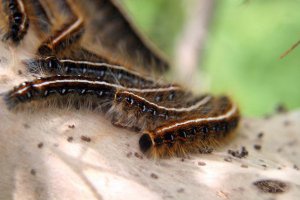 MOFA says the fall army worm were first discovered in the US in 1779
MOFA says the fall army worm were first discovered in the US in 1779
The Ministry of Food and Agriculture at a media interaction has refuted claims that the Fall Army worm outbreak was developed in foreign laboratories.
The department of Agriculture under the ministry says the fall army worm have been existence for ages and the it is focusing on how to "control their rate of destruction."
“The pest has come to stay, and we only have to put in place interventions and programs that would control their rate of destruction and ensure food security in the country,”said the Greater Accra Regional Director of Agriculture Mr Delali Nutsukpo
Mr Delali Nutsukpo said the worms were discovered in the in Georgia USA as far back as 1797,adding that it was only known to that part of the world until their recent migration to southern and lately West African countries.
The media engagement was held in the Greater Accra region for only journalist in the southern sector on the theme “Reporting on Fall Army Worm.”
It brought Journalists from the Volta, Central, Greater Accra and the Western Regions to deepen media knowledge and ensure accurate reporting on the matter.
he Fall Army worm canker became an area of concern in 2016 and 2017 where large tracts of farmlands particularly cereals were destroyed by the worms.
It is a migratory moth which could attack about 80 species with its larvae, but in Ghana, the pest had become a maize threat to food security because they are largely found in cereal-maize which could be harvested and stored for a longer time.
The government therefore set up the national task force to find ways and means of controlling the situation.
Dr Nii Okai Hammond, a member of the National Taskforce, said the team together with the Ministry was working to ensure that insecticide distribution was fairly carried out, capacity of the farmers built on early detection and management as well as regular monitoring.
So far, three pesticides have been discovered to effectively control the fall army worm and would soon hit the market for farmers to use.
Dr Sagre Bambangi, Deputy Minister of Agriculture, said it is important to create awareness on the pest infestation especially this cropping season and also educate farmers on the concern.
He said the Ministry was implementing a strategy for the 2018 cropping season by strengthening the national pests surveillance system, conduct research into the biological control and establish a strategic stock of pesticides in the regions